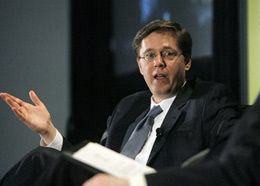By John Dunbar
The Associated Press
 AP Photo/Jae C. Hong FCC Chairman Kevin Martin speaks during the Consumer Electronics Show (CES) in Las Vegas earlier this year. |
WASHINGTON — A government plan to build a nationwide emergency communications network using private money and public airwaves flopped earlier this year when investors stayed away in droves.
On Thursday, the Federal Communications Commission was trying again, this time in the midst of a full-blown economic crisis.
The commission was scheduled to vote on a tentative plan that makes the idea more palatable to potential investors — perhaps too palatable, some say.
The proposed network would be used by police, firefighters and other emergency crews responding to disasters or terrorist attacks.
The basic concept is unchanged, according to people familiar with the draft, which has not yet been made public.
The agency would auction a swath of airwaves — made available thanks to the transition to digital broadcasting — to a private bidder. That spectrum would be combined with a roughly equal portion of airwaves controlled by a public safety trust.
The private investor would build a wireless network and lease access to emergency responders while selling wireless service to commercial users for profit.
In March, the plan failed to attract a minimum bid of $1.3 billion. Potential investors said the proposal was too vague and too risky to serve as the basis of a multibillion-dollar investment.
Ideally, a new network will help solve the problem of public safety organizations not being able to communicate with one another. It also would avail emergency personnel of many of the advances in wireless technology that are accessible to commercial users.
The FCC says a national network could cost between $6 billion and $7 billion, but private sector estimates are more than double that amount.
To make the plan more appealing to investors, the revised FCC plan would reduce the minimum bid for a national license by half and relax requirements on how quickly the bidder must construct its network. The plan also would allow bids on regional licenses rather than require only a single, national license.
“My policy priority is less about the impact on competition or how much money we raise, but more about the impact on making sure that local police, fire and medical personnel are able to communicate with each other during emergencies,” FCC Chairman Kevin Martin told reporters in a conference call earlier this month.
The draft rules would allow the private bidder to charge public safety organizations $48.50 a month, per user, which could be “cost prohibitive” to smaller and rural public safety users, according to Jessica Zufolo, a telecommunications analyst for Medley Global Advisors.
It is difficult to say whether any company will bid this time around.
Contenders include AT&T Inc. and Verizon Wireless, the nation’s top two wireless providers. The companies have paid billions of dollars for similar spectrum. Adding a public safety component to their networks would be easier for them than for a company starting from scratch.
“Because they’ve already allocated the substantial resources necessary, there would be just an incremental increase in construction costs,” Zufolo said.
But auctioning by region may make it easier for smaller carriers to participate.
Adding to the sense of uncertainty is the current financial climate. With Congress considering a $700 billion bailout of the financial industry, banks are not in a position to lend billions for a largely speculative undertaking.
It is also difficult to say when such a network might be built. Martin is recommending a short comment period on the new plan, a move that drew protests from top Democrats on the House Energy and Commerce Committee, who want more time to look over the proposal. The chairman’s current timetable could result in final rules in November.
An auction could take place six months to nine months later.











